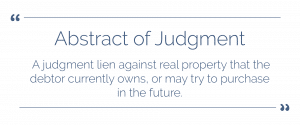

Updated on January 25, 2024
Let’s say you have just won a money judgment in court against a defendant who owed you a sum of money. What do you do next? Winning a money judgment doesn’t mean that you automatically get the money in your account immediately. There are other steps that you need to take to actually collect the money from the person who owes it to you (also known as the debtor).
If you are dealing with a debtor who has money to pay you and is willing to follow the court’s judgment, then collecting the money is easier, as the debtor can just write you a check for the required amount. However, if you are dealing with a debtor who does not appear to have any money to pay you, things get more complicated.
If the debtor does not have money to pay you but owns real property (or if you think the debtor may attempt to purchase real property in the future), you can obtain what is called an Abstract of Judgment. An Abstract of Judgment is a judgment lien against real property that the debtor currently owns, or may try to purchase in the future.

Thus, if the debtor tries to sell or refinance real property she currently owns and you have obtained an Abstract of Judgment against her, she will be forced to pay the money she owes you with interest before completing the real estate transaction she is attempting. If the debtor does not own real property now but tries to purchase real property at some time in the future, the purchase cannot go through until the debtor has paid you back the money owed with interest. In California, interest accrues at a rate of 10% per year from the date of the judgment.
In California, the Abstract of Judgment is a Judicial Council form that can be downloaded from any court website (Form EJ-001). The form asks for information regarding the debtor’s name, last known address, driver’s license number, and the amount of money the debtor owes you. Once the form is filled out, it must be filed with the clerk of the court that issued the original money judgment. Once the clerk of the court has certified that the form is correct, the clerk will stamp it and officially “issue” it. The stamped form is known as the conformed or certified Abstract of Judgment, and it is the legal proof of the money judgment owed to you by the debtor. You will have to pay an issuance fee to the clerk for the issuance of the form.
Once you have the conformed/certified Abstract of Judgment, the original form must be recorded with the recorder’s office in the county where the debtor owns real property. If the debtor owns real property in various counties, be sure to record the Abstract of Judgment in every county where the debtor owns such property. Similarly, if you think the debtor may buy real property in a particular county in the future, record the Abstract of Judgment in that prospective county as well.
A good rule of thumb is to record the Abstract of Judgment in the county where the debtor resides or does business. You will have to pay a recording fee to the recorder’s office for each recording. Once the recorder’s office has recorded the Abstract of Judgment, it officially becomes a lien on the real property the debtor owns in the county now or may acquire later. The recorder’s office will give the Abstract of Judgment back to you. Be sure to keep this document, as you will need it in the event the debtor pays you back and you have to then complete an acknowledgment of Satisfaction of Judgment.
The lien created by the recorded Abstract of Judgment continues for 10 years from the date of entry of the money judgment, and can be renewed for additional 10-year periods. When you renew your Abstract of Judgment, you will need to prepare new Abstract of Judgment form with the updated amount owed to you (including any accumulated interest), and you will need to record it in the appropriate county or counties.
Determining whether to file and record an Abstract of Judgment can be difficult, and the actual filing and recording can be confusing if you are not familiar with the process. Additionally, California has a number of exemptions and rules that may affect your ability to collect from a debtor under an Abstract of Judgment. For example, under a homestead exemption, there is a fixed amount of value that cannot be used to satisfy the money judgment if the property at issue is the debtor’s primary residence. The existence of other liens, or foreclosure or bankruptcy proceedings can also complicate matters. If you are considering obtaining an Abstract of Judgment, talk to a LA real estate attorney.
At Schorr Law, our top real estate attorneys in los angeles are experienced in handling Abstracts of Judgment, including preparation, filing, and recording, and we can provide counsel on a range of matters involving real property judgment liens. To see if you qualify for a free 30-minute consultation regarding your matter, please contact us.